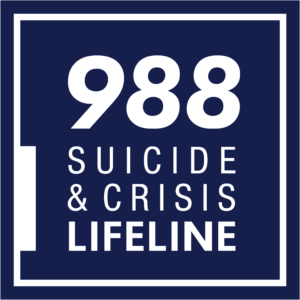Trigger Warning: Suicide
If you or someone you know has suicidal thoughts, please call the National Suicide Prevention Lifeline at 988.
Michael Phelps is a world champion with 28 Olympic medals to his name. In addition to his successes, he openly discusses that he knows what it’s like to struggle – including having suicidal thoughts.
He described one low point in his life in particular: “I hadn’t left my room for five days. I questioned whether I wanted to be alive anymore. I realized I am the strongest person I know, but I felt like the weakest,” he said, according to Talkspace. He credits his decision to see a therapist with saving his life, according to the website.
If you or a loved one has been having suicidal thoughts, a mental health professional can be an important lifeline. Here are answers to some common questions about the process.
Should I open up about my suicidal thoughts or keep it to myself?
Thinking about suicide can feel so heavy that you might be fearful to even talk about it. However, mental health professionals are trained to offer confidential support and coping skills based on what you’re going through. Open conversations help them understand what kind of support to provide.
“If you don’t talk about it, your therapist will not be able to assess both the severity of your depression and the likelihood that you really might do harm to yourself,” according to a Psycom article. “It’s important to understand your ‘suicidal ideation,’ which can include a range of passive wishes and preoccupations with death, and to determine if there is suicidal intent (a firm plan).”
Once your therapist understands the severity of your depression, they can help you with your next steps, according to the article.
What impression will they have of me if I say I have suicidal thoughts?
Having suicidal thoughts isn’t uncommon. In 2021, an estimated 12.3 million American adults seriously thought about suicide, according to the Centers for Disease Control and Prevention website.
While you may wonder what your therapist will think if you mention suicide, they will likely approach your care in a nonjudgmental way. They may even see your discussion as a useful step in helping you learn to manage these difficult moments and feelings.
“A person might also be ashamed of her suicidal thoughts, believing they represent a personal failing on her part, when in fact they’re a fairly common response to intense distress. If she doesn’t feel free to be open about these thoughts in therapy, she may have no place to discuss them,” according to Psychology Today.
“Most disturbingly, choosing not to seek treatment for this reason could prevent a person from getting the help she needs, thereby increasing the risk for acting on the suicidal thoughts. Clinicians generally consider it a positive sign when a patient discloses thoughts of wanting to die; it’s much more concerning when a suicidal person says nothing, and thus remains at higher risk.”
Will they turn me into police?
Many people avoid talking about their suicidal thoughts because they fear their therapist could commit them to mental health services against their will. However, that shouldn’t be a cause for concern, according to some experts.
“Unfortunately there’s a lot of stigma around suicidal ideation,” says Seth J. Gillihan, a clinical assistant professor of psychology in the psychiatry department at the University of Pennsylvania, according to Allure. “I’ve definitely found in my clinical work that many people are reluctant to bring it up and will refer to it obliquely, hoping to convey their experience without saying something they think will cause me to have them committed to an inpatient facility.”
Yet, many experts say that this is not the case. Many providers will look at a variety of treatments depending on the patient and their situation.
“Trained professionals know that simply having suicidal thoughts is not a reason to have a person committed to the hospital,” continued Gillihan. “Many people continue to function with some degree of suicidal thoughts and feelings, with a low enough risk that hospitalization is not only not needed but would be counterproductive.”
If I say I’m having suicidal thoughts, what will be their next question?
“A therapist will begin with a gentle detailed inquiry, and based on the shared disclosures, will determine with you what is the best treatment approach to deal with suicidal thinking,” according to Deborah Serani, a senior professor at Adelphi University, in the Allure article. “If a person shares that they have no plan or intent, or that the thoughts come and go, increasing treatment sessions to twice or three times a week will reduce thoughts and urges and address depressive symptoms.”
If the therapist believes the person may attempt suicide or is at risk of self-harm, they may work with them to develop a safety plan, according to an article in Psychology Today.
“The severity of the risk will determine the course of action. A high level of danger for the person might require hospitalization to ensure their safety,” according to the article. “When the clinician concludes that there is no emergency, they will likely develop a safety plan with their patient.”
A safety plan can have many different components, but it is often developed as a collaboration between a therapist and the patient. A safety plan may include loved ones so that the person at risk has a safety net and people looking out for them. The safety plan may include:
Triggers/warning signs – helping loved ones and the patient understand the warning signs and potential triggers. The American Foundation for Suicide Prevention (AFSP) says to look for three things:
- Talk – if the person says they want to die or have no reason to live
- Behavior – if the normally engaging person suddenly withdraws, refuses to participate in activities they previously enjoyed, and/or starts to drink or take drugs
- Mood – if the person’s mood changes – like if a happy person becomes withdrawn, sad, anxious or depressed. Importantly, you should also be aware of a mood change from a person who has struggled with depression suddenly shows relief
Remove the means – another important step is removing anything from the person’s possession that they could use to self-harm. “If a person does not have access to lethal means they will not die from self-harm behavior,” according to the AFSP. “It’s about helping a person stay alive through a crisis and therefore removal of lethal means may be temporary.”
Call in family and friends: It is important to surround the person with loved ones. The AFSP suggests that if you have concerns about someone, you should:
- “Talk to them in private
- Listen to their story
- Tell them you care about them
- Ask directly if they are thinking about suicide
- Encourage them to seek treatment or contact their doctor or therapist
- Avoid debating the value of life, minimizing their problems or giving advice”
Get professional help: If you are worried that you or someone you love is thinking about suicide, professional help is important. Encourage them to seek treatment or contact their doctor or therapist. If the person is in immediate danger, the National Suicide Prevention Lifeline is now the three-digit 988 Suicide and Crisis Lifeline to make the call easier.
Finding help for suicidal thoughts
No matter the circumstances, suicidal feelings should always be taken seriously — especially if you’re starting to have them more often.
“We have learned that suicidal ideation comes and goes for many people and that the most effective way for treatment to help people get through periods of increased suicide risk is for treatment providers to hone in on the person’s unique triggers and concerns and help them directly,” according to an article on the AFSP website. “If a person is experiencing a mental health condition, it is important to treat the mental health condition, but it is not necessarily enough for reducing suicide risk. Helping people to connect more closely to their reasons for living along with actively learning to resist urges to engage in suicidal behavior are essential components of helping people to manage suicidal ideation and engage in life more fully.”
If you’re looking for a therapist, Psychology Today maintains a Therapist Finder to connect people to local support options.
With proper care and support, you can start to feel better. You don’t have to feel helpless, and you don’t have to struggle alone.
For more information about this topic, please visit:
https://genesight.com/blog/patient/grieving-healing-after-a-loved-ones-suicide/
https://genesight.com/blog/patient/recognizing-warning-signs-of-suicide-in-teens/
https://genesight.com/blog/patient/suicide-and-social-media-risks-and-how-to-help/
Our articles are for informational purposes only and are reviewed by our Medical Information team, which includes PharmDs, MDs, and PhDs. Do not make any changes to your current medications or dosing without consulting your healthcare provider.
The GeneSight test must be ordered by and used only in consultation with a healthcare provider who can prescribe medications. As with all genetic tests, the GeneSight test results have limitations and do not constitute medical advice. The test results are designed to be just one part of a larger, complete patient assessment, which would include proper diagnosis and consideration of your medical history, other medications you may be taking, your family history, and other factors.
If you are a healthcare provider and interested in learning more about the GeneSight test, please contact us at 855.891.9415. If you are a patient, please talk with your doctor to see if the GeneSight test may be helpful.









